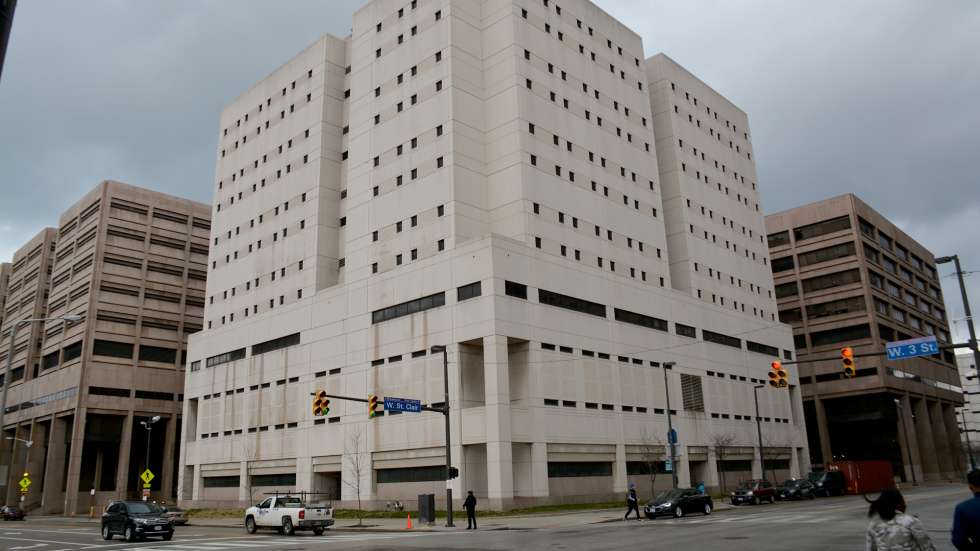Veteran’s Death Highlights ‘Inhumane’ Conditions in an Ohio Jail
A newly amended class-action lawsuit accuses the Cuyahoga County jail of neglect and mistreatment.

When Nicholas Colbert, a 36-year-old Army National Guard veteran, died last Friday in the Cuyahoga County jail in Cleveland, he became the ninth detainee to die in the jail system over the last year—and the fifth to die by suicide.
Colbert was arrested last Tuesday on a drug-possession charge and was being held in the jail on $1,500 bond. His family said they had hoped jail would help him avoid what they feared would be a fatal heroin overdose out on the streets. This week, the Cuyahoga County medical examiner confirmed news reports that Colbert hanged himself.
“I expected to lose him out there, but I didn’t expect to lose him in jail,” Colbert’s mother, Laura Colbert, told local news reporters. “It was the one place I wanted him to be so he could be alive.”
People more familiar with the jail and its history said Colbert’s death fits a tragic pattern. “It is absolutely appalling and devastating to learn that yet another death has occurred inside the Cuyahoga County Jail,” LaTonya Goldsby, co-founder of Black Lives Matter Cleveland, told The Appeal by email. “There is something critically wrong with our County Jail, and our criminal justice system, that when a non-violent detainee is booked into our county jail, they’re immediately placed in what could be considered Death Row.”
Despite the county’s promises to improve the jail and assurances that improvements have already happened, current detainees say the problems persist. The jail’s conditions are the subject of a class action lawsuit filed in December that was amended last month. Twenty plaintiffs, including current and former detainees, accuse the co-defendants—Cuyahoga County Executive Armond Budish, County Sheriff Clifford Pinkney, and MetroHealth System and its medical director—of failing to provide safe and habitable living conditions for people incarcerated in the jail.
Specifically, the lawsuit argues that the defendants have neglected to provide adequate medical care, including mental-health treatment, or proper accommodations for individuals with physical and mental disabilities. The amended lawsuit includes 13 additional plaintiffs, who are formerly or currently incarcerated at the jail, and adds to the mounting pressure against the county to change its practices.
In November 2018, the U.S. Marshals Service called the Cuyahoga County jail “one of the worst” in the country and claimed that those incarcerated there were being held in “inhumane,” dangerous conditions. The report found that detainees often slept on the floor, were fed meals that were not properly refrigerated, and were placed in overcrowded, unfurnished cells without functioning toilets or running water. Those who were placed in “red zone” lockdowns were kept in their cells for 27 hours or more, the report found, and lacked basic amenities like toothbrushes and toilet paper.
Both adults and juveniles were subjected to these extreme conditions. As a result of their findings, the U.S. Marshals removed federal detainees from the jail, but roughly 1,800 state and local detainees remain.
“This must change, and it will change,” Budish said in a statement after the U.S. Marshals report was released. “It’s my plan to develop and implement a comprehensive plan to improve safety in the jail, addressing the concerns detailed in the report.”

In December 2018, protesters gathered outside Budish’s home and at a County Council meeting in order to issue a list of demands, including an end to overcrowding, immediate bail reform, and better medical care. Budish responded at the council meeting by listing the issues that had already been addressed. “Withholding food is not being used as punishment, shower curtains have been installed to maintain privacy. There are no pregnant women sleeping on the floor. And no one is denied toilet paper,” he said.
A week before the Marshals’ report came out, jail director Ken Mills resigned with little explanation. In January 2019, he was indicted on corruption charges including felony charges of tampering with records and telecommunications fraud. (The former warden and two corrections officers were also indicted on separate charges.) Around the same time, the county announced that MetroHealth would be expanding its medical services in the jail, and would be hiring more staff. Budish said the “new, comprehensive plan would serve as a model throughout the country.” In February, Budish said the jail no longer violated the rights of the people incarcerated there, citing a decrease in the jail population.
The lawsuit tells a different story. With accounts from people incarcerated in the jail this year and as recently as last month, the plaintiffs allege that people are still sleeping on the floor due to overcrowding and that “red zone” lockdowns are stopping people from getting adequate healthcare, showers, and recreation.
The lawsuit also accuses the jail of violating the Americans with Disabilities Act and discriminating against detainees with disabilities by not supplying adequate medical care. One person who has been incarcerated at the jail since February 2018 claims his CPAP machine was taken away and he has had trouble sleeping because of chest pain, shortness of breath, and a racing heartbeat.
Other plaintiffs reported experiencing anxiety attacks or withdrawal symptoms due to not being given their proper medication. Still others’ wheelchairs were confiscated when they were incarcerated; some of those individuals were given walkers. Roy Bridget, 36, has nerve damage that reduces his ability to use his right leg and arm. He was given a walker when he was admitted into the jail, even though he is unable to walk with one. As a result, he is often confined to his cell and has been unable to shower.
The sheriff’s office and the county executive’s office did not respond to requests for comment on the allegations made in the amended suit.
The stories of mistreatment included in the lawsuit and the string of deaths in the jail have taken place within a broader context of stunted bail-reform efforts in Cuyahoga County in recent years. A 2017 study by the Pretrial Justice Institute, found that despite declines in the number of violent and property crimes, there had not been a commensurate decline in jail bookings or average daily populations.
In October 2018, Judge Michael L. Nelson Sr. announced he would stop sending low-level defendants to jail due to unsafe conditions. And in January, the Ohio Supreme Court created a bail reform task force to examine how bail is being used throughout the state and give recommendations. Since then, some changes have been made, such as more pretrial services for people arrested on misdemeanors. Activists are calling on County Prosecutor Michael O’Malley to address the crisis by adopting reforms pioneered in other counties, noting that he has tremendous power over whom his office prosecutes.
The Coalition to Stop the Inhumanity at the Cuyahoga County Jail, which includes both Black Lives Matter Cleveland and Puncture the Silence-Stop Mass Incarceration, has organized many of the protests against Budish, and has been canvassing Cleveland neighborhoods to hear about people’s experiences with the jail and build its campaign against the county executive and other jail officials. The coalition is organizing a “mass action” on May 23. Its members continue to call for Budish, who was elected to a second term in November 2018, and other county officials to meet their demands. Budish’s next election will be in 2022.
“Until our city officials acknowledge that there are systemic issues in the ways in which our County Jail operates, and the current structure of our criminal justice system,” Goldsby wrote in an email, “these deaths will continue to happen.”
